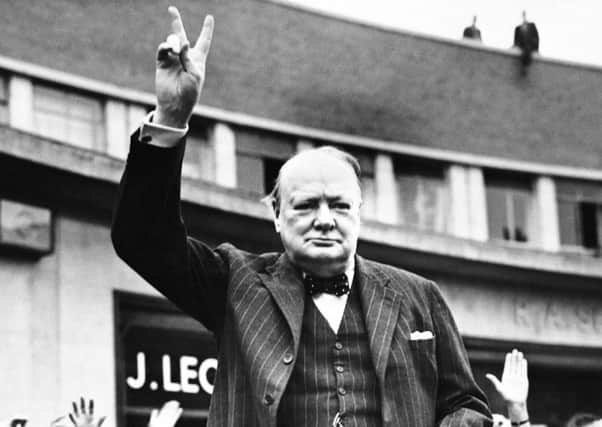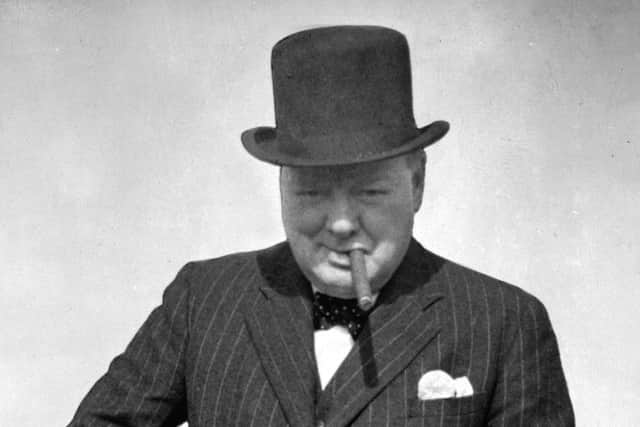Stephen McGinty: So much owed to one man


THE wife of Winston Churchill’s last private secretary makes an exceedingly good shepherd’s pie. I still think fondly of the afternoon I spent in Kent in the company of Mr and Mrs Anthony Montague Browne in their comfortable, elegant home on whose walls were dotted the watercolours of the Greatest Briton.
While lunch consisted of the aforementioned pie, and delicious it was too, the true meat and drink was chewing over the life of Winston Churchill with one who knew him in his final years. He was with him on the evening before the great stroke that finally killed him 50 years ago today, and was there at what was the greatest funeral in Britain in the 20th century.
Advertisement
Hide AdAdvertisement
Hide AdWhat I remember most about our afternoon together was Montague Brown talking of how unhappy Churchill was in his final years, how when he looked back on his life, he did not see the successes, only the failures. He wanted what he could not achieve, he wanted an end to the Cold War, whose most memorable phrase, “the Iron Curtain” he coined, and he wished Britain to remain a great nation with an expansive empire. It seems fitting somehow that a figure as great as Winston Churchill could never be at rest, their ambitions were too great, too expansive, too overwhelming to ever be adequately sated and this took a toll. Churchill has long been known as a depressive, who talked of the “black dog” that followed on his heels, and that is one of the many ways I find him so deeply appealing as a politician.


FOLLOW US
-----------------------------------------
-----------------------------------------
SCOTSMAN TABLET AND MOBILE APPS
We know about his weaknesses and it is the weaknesses, the low points, the depressions and failures that I find most interesting about great men and women. In a way success is rather boring. Achievements are quite dull. It is the difficult times, the times of struggle that I find most appealing. For instance, the most recent volume of Robert A. Caro’s multi-volume life of President Lyndon B. Johnson has a scene that, more than any I’ve ever read, captures the weight of responsibility for political leaders. It is the days after the assassination of John F. Kennedy and Johnson is weighed down like never before, every minute of 20-hour days accounted for and behind his eyes is the growing fear that the Russians may have been involved in the president’s murder and the Armageddon that could follow if this was to be true. When he finally goes to bed, he asks his assistant to sit in the room until he falls asleep. After sitting for an hour or so in the darkness, the assistant gently rises and moves towards the door when a voice from the darkened bed says: “I’m not asleep yet.”
The most powerful man in the world afraid to be alone in the dark. The political giant as frightened child. You might have imagined Winston Churchill would have had just such a moment in May, 1940 when he was finally appointed as Prime Minister of a Britain faced with its darkest hour, and yet he writes that when he did put out the light he slept soundly as he knew his hour had come and that he was walking hand-in-hand with history. This sense of destiny is strange. As a child he explained how there would come a time when Britain was in dire danger and it would fall to him to rescue the nation. There are those who are dismissive of such ideas, who viewed him as a warmonger and point out that it was the thousands of men in the British army who fought and died who saved the nation and this, of course, is true.
But I believe that the reason for his greatness is tied up with those crucial days in May, 1940 when the cabinet was split, when France had fallen, when invasion seemed inevitable and Lord Halifax, the Foreign Secretary, spent time at his country retreat looking out over the soft undulating countryside and decided that it was worth doing a deal with Hitler in order to stop it being destroyed. Churchill had a similar view at his home in Kent and pondering it came to the exact opposite decision, he would rather it became a charred wasteland with vast swathes of his countrymen dead and dying rather than capitulate to the jackboot of Nazism and the poisonous, murderous creed of Adolf Hitler.
We only have to look at the fate of Jersey to imagine what would have happened if Lord Halifax’s view had triumphed, an occupied island where the British bobby knocked on the doors of a local family and requested that the Jewish women accompany them. The debt we owe Winston Churchill is immense, a debt we also owe to Joseph Stalin for, as many people refuse to acknowledge, it was not the combined might of Britain and America which won the Second World War but the Russians and a nation willing to bleed like no other, before or since.
I know it may come across as sentimental tosh, but I do rather love Winston Churchill. I love him for his smelly cigars, which became a flaming torch of victory. I love him for the corduroy onesies, the belted boiler suits he would put on while working on his many books. I love the fact that he started each day with a cooked breakfast and champagne, took regular afternoon naps and was an advocate of dictating in the bath. As a journalist, I love the fact that when he delivered copy to the Daily Mail, it was sent by a chauffeur who was instructed to collect a cheque of payment immediately upon handing over the typescript. I love the way he loved his wife, Clementine, and the vast correspondence they accumulated over their long life together. I love the fact that, as Home Secretary with the ultimate weight of responsibility of hanging the condemned, he would request the files of those due to meet the hangman’s noose and in the quiet of the evening in his office act out their defence in a bid to pardon.
Yet what I especially love about Winston Churchill is his tenacity, his grit, his recognition that success is defined as “the ability to go from one failure to another without any loss of enthusiasm”. I love the fact that if he had died at the age of 59, prior to the outbreak of the Second World War, he would have been viewed as a failure, and that his greatest successes came at an age when some men retire. I love his succinct advice in times of trouble and strife: “If you are going through Hell - keep going” and his personal motto: “K.B.O – keep buggering on.”
I love the fact that none of this was a meaningless quip, that he had repeatedly fallen short and failed, fired after the fiasco of Gallipoli or devastated by the death of his young daughter, Winston Churchill had known dark times and his advice is timeless.
Advertisement
Hide AdAdvertisement
Hide AdOn the 50th anniversary of his death and the anniversary of a funeral where even the giant iron cranes along the Thames were moved to bow their head in respect, it would be shameful not to allow this wordsmith the final say: “Never give in – never, never, never, in nothing great or small, large or petty, never give in except to convictions of honour and good sense. Never yield to force; never yield to the apparently overwhelming might of the enemy.”